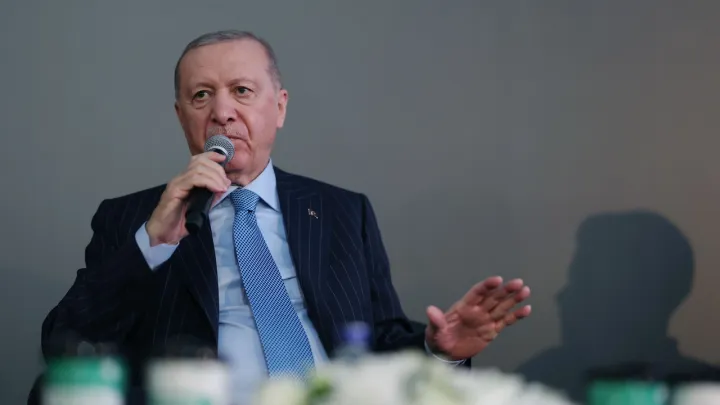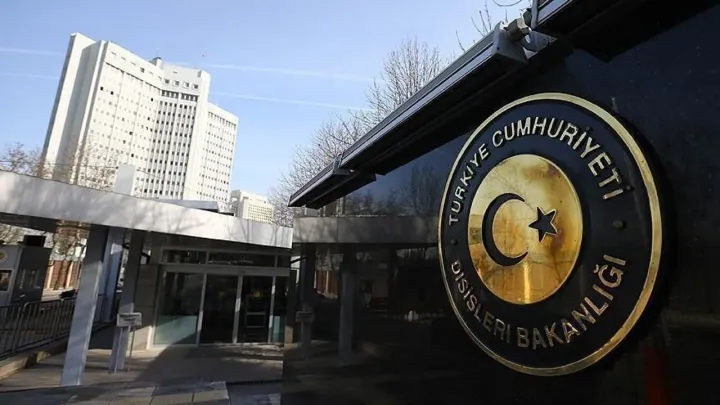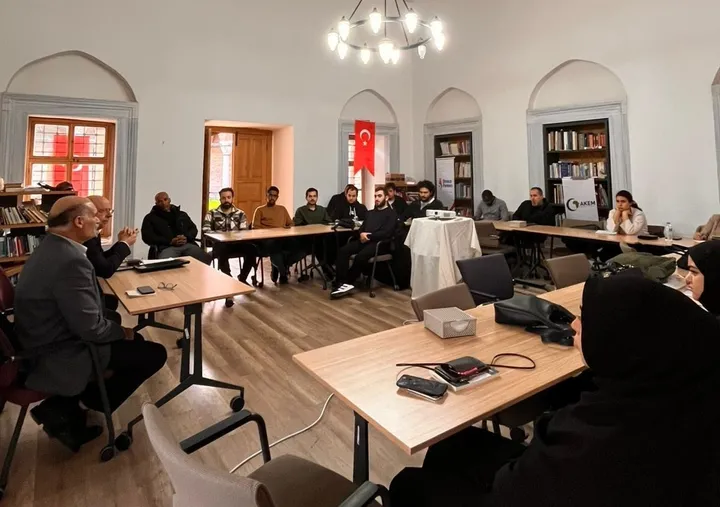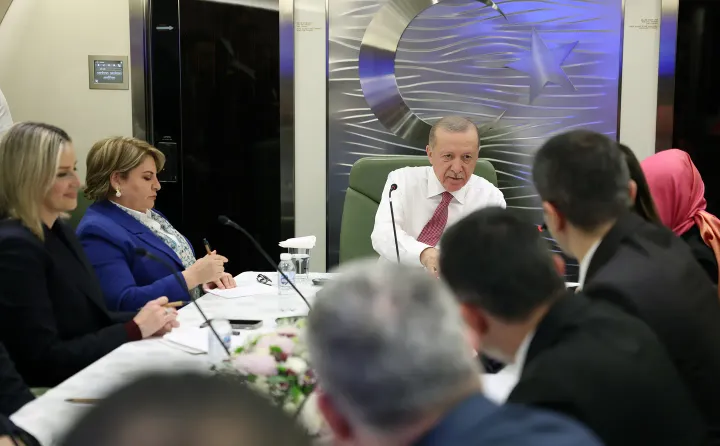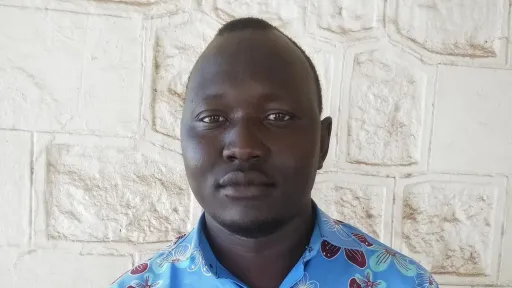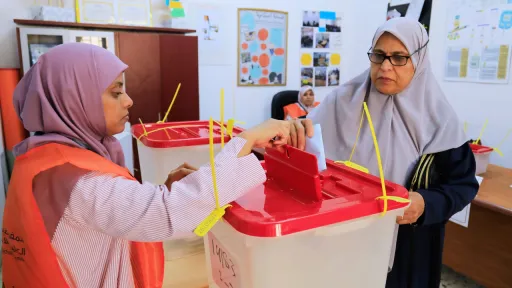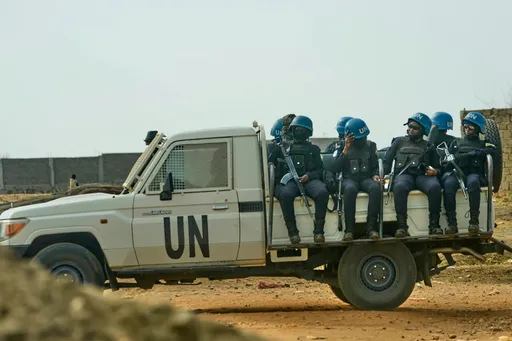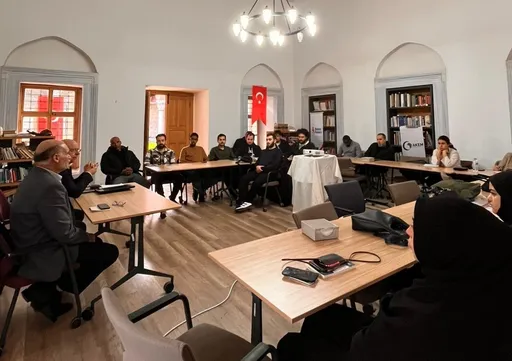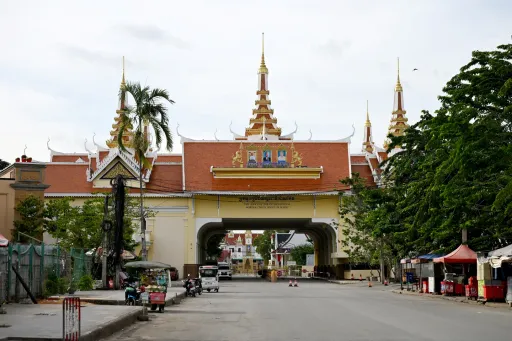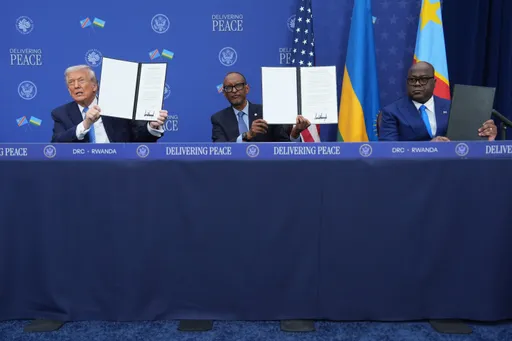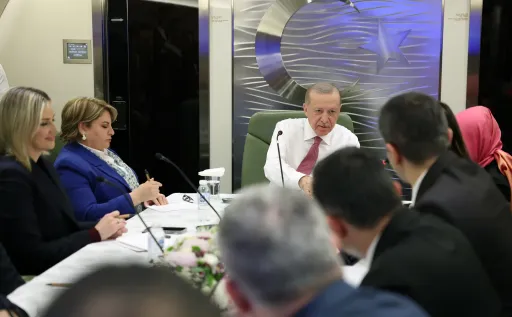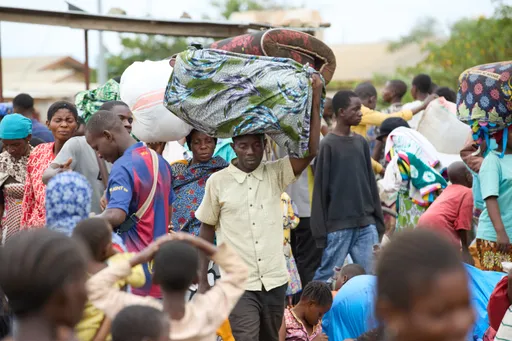By Tuncay Şahin
Türkiye will continue to pursue terrorists who are behind the deadly attack at the Turkish Aerospace Industries’ facility in Ankara, said Turkish President Recep Tayyip Erdogan.
“Our commitment to combat terrorism is unyielding,” he told journalists on Friday on his way back from Russia, where he attended a BRICS summit, stressing that Türkiye would tackle threats “at their source” to pursue a future “free from terror.”
The Wednesday attack, which killed five and left several injured, was carried out by two terrorists, both of whom were neutralised by Turkish security forces.
Erdogan reiterated his government’s unyielding resolve to confront terrorism at its roots, calling it an assault on Türkiye’s national security.
"This was an attack on Türkiye’s future," he said, underscoring the symbolic significance of TAI.
In response to the attack, Türkiye launched a series of retaliatory operations. Intelligence pointed out to the PKK’s involvement, with the perpetrators infiltrating from Syria.
Erdogan praised the swift and coordinated response of Türkiye’s security apparatus, highlighting overnight operations that targeted 40 sites connected to the perpetrators.
Erdogan had travelled to Kazan, Russia, on the invitation of Russian President Vladimir Putin to attend the BRICS summit.
Broader strategy against terrorism
The Turkish President detailed a multifaceted strategy for combating terrorism, which spans military, financial, and diplomatic arenas.
"Our aim is a Türkiye free of terror," Erdogan declared, pointing to ongoing efforts to dismantle terrorist organisations in Syria, particularly the PKK's Syrian branch, PYD/YPG.
He reinforced that Türkiye’s fight is not merely against individuals but with the larger networks and their enablers.
"These groups are merely proxies," he said, stressing that Türkiye would not waver in its fight for national sovereignty and unity.
He also expressed skepticism about the reliability of the United States as a partner in this struggle, noting America’s support for the terrorist group YPG in Syria.
"We are well aware of the dynamics at play," Erdogan noted, "and our priority remains the security of our borders and the safety of our people."
Strengthening BRICS
Erdogan expressed Türkiye’s desire to deepen relations with the BRICS nations, which represent 30 percent of the world’s landmass and 45 percent of its population, Türkiye’s BRICS engagement aligns with its pursuit of diversified international partnerships, he said.
“Türkiye’s interest in BRICS is about economic cooperation, not as an alternative to NATO,” he clarified, stressing that Türkiye remains a bridge between East and West.
In discussions with leaders, including Putin and Venezuela’s Nicolas Maduro, Erdogan explored areas of mutual economic interest, emphasising Türkiye’s policy of “win-win” diplomacy. “We are pursuing partnerships based on mutual respect and common benefit.”
Towards an alternative financial order
A major topic at the BRICS summit was developing an "alternative financial system" to the current global model that is dominated by the US dollar.
Erdogan, who has long advocated for reducing dependency on Western financial mechanisms, reaffirmed Türkiye’s commitment to trading in national currencies wherever possible.
In response to recent comments by former US President Donald Trump, who suggested penalising countries that move away from the dollar, Erdogan stressed the importance of financial sovereignty.
"Our goal is not to compete but to diversify," he explained. "Local currencies in trade can protect economies from external shocks and foster more equitable relationships."
The West’s position on Gaza
President Erdogan's discussions with global leaders at the BRICS summit also centred on the increasing Israeli violence in besieged Gaza and southern Lebanon.
“We will not remain silent while innocent lives are lost,” he said.
Erdogan sharply criticised Western nations, particularly the US and Germany, for providing military support to Israel amidst what he described as a humanitarian crisis.
“Many Western countries remain silent on Israel’s atrocities in Gaza, turning a blind eye due to historical guilt. This silence is tantamount to complicity,” he said. "By defending Israel at all costs, they are risking their own moral integrity.”
He praised countries like Spain, Ireland, and Norway for their steadfast support of the Palestinian cause. Erdogan urged BRICS members to amplify their support for Palestinian rights and to oppose Israeli military actions.
Türkiye has campaigned for a United Nations-backed arms embargo on Israel, citing escalating violence in Gaza and southern Lebanon.
Erdogan confirmed ongoing discussions with European leaders, including Italy’s Giorgia Meloni and officials from Spain and Ireland, to build a coalition that would restrict Israel’s access to arms.
“We must restrict access to arms that enable the killing of innocents,” he said, advocating for what he called an “Alliance of Humanity” to exert pressure on Israel to end its military aggressions.
Normalisation with Syria
Erdogan hinted at a possible reconciliation with Syria’s Assad regime, marking a potential shift in Türkiye’s regional policy.
He noted that Türkiye’s willingness to normalise with Damascus would depend on Syria’s commitment to preserving its territorial integrity and eliminating terrorist groups in the region.
“We hope to see concrete steps toward stability and that Assad understands the benefits of genuine normalisation with Türkiye,” he remarked, adding that he had discussed the matter with Putin with an eye toward a cooperative Syrian stance.
Relations with China
Turning to China, Erdogan highlighted the longstanding historical ties between the two countries, framing them as heirs to ancient civilisations with shared strategic interests.
He sees potential for deepening Türkiye’s strategic partnership with China, especially in trade and investment.
“We discuss a range of issues with our Chinese friends, from increasing bilateral trade to investment potentials,” he said, hinting at an upcoming visit from Chinese President Xi Jinping.

